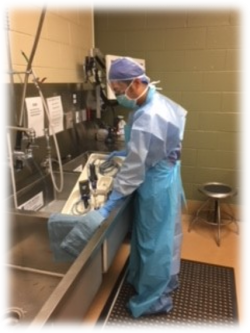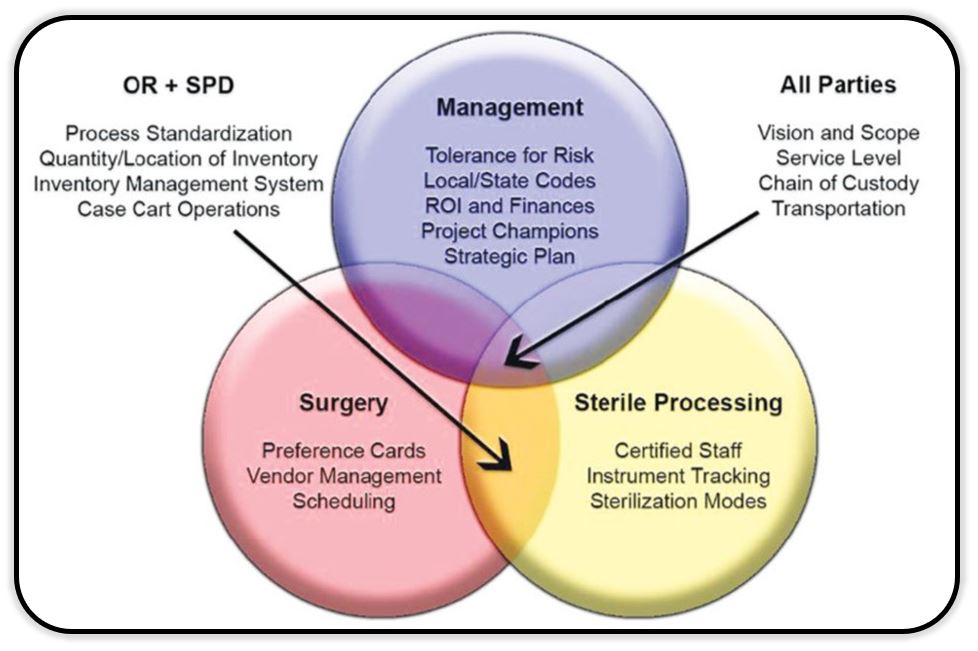The Role of the Sterile Processing Technician – The Unsung Hero of Perioperative Services
Jan. 31 2020, Alina Barnas

The role and responsibilities of the sterile processing technician can be demanding. Technicians are responsible for having a vast understanding of instrumentation, equipment, and trays of various complexities. They need to understand how to process equipment and how to apply and use various supplies needed for every surgical procedure, from major to minor and from simple to complex procedures.
The role of the technician begins at the completion of surgery. They must follow the life cycle of the decontamination process, including cleaning, disinfection, inspection, packaging, sterilization, storage, and transport back to the operating room or procedure area. At each phase, understanding the intricacies of each step and the consequences if steps are missed or not completed is paramount.
An effective and efficient Central Sterile Processing Department (CSPD) is almost solely dependent on the efficiency and expertise of the Central Sterile Supply staff. The OR is one of the most intricate of all hospital services, requiring coordination of information flow, equipment, supplies, processes, expertise, and management. One of the most important aspects of the integration of services between the OR and CSPD is the ability to increase the circular flow between the operating rooms and CSPD. This is accomplished by increasing the quality and quantity of trays and supplies delivered, increasing process efficiency, and decreasing valuable operating room downtime or delays. Delays and cancellations have a real-time impact and hurt the bottom line of health care systems. When any one of these elements is missing, a poor outcome can result. For CSPD, this could be surgery delays due to a lack of instrument sets available for the number of scheduled cases, or lack of a specific piece of equipment that is vital to complete a specific surgical procedure.
Sterile processing departments are often considered the manufacturing hub of the hospital or surgical center. It is where instrumentation sets and equipment go through quality assurance standards created by CSPD leaders, technicians, and hospital leadership, and represent a great opportunity to apply Lean processes to improve efficiency, eliminate waste and standardize work. When a philosophy of continuous process improvement and collaboration exists between the OR and CSPD team it can greatly assist CSPD technician in achieving their daily goals of delivering exceptional care and delivering terminally sterilized sets at the point of use for the patient who is about to undergo surgery.
CSPD technicians are the quiet and sophisticated unsung heroes of surgery; without their dedication and commitment, surgery would not occur every day and we would not save lives and alleviate pain and suffering. Being “unsung” means this crucial team does not enjoy the visibility and recognition of patient-facing perioperative staff. Regularly acknowledging the essential role and specialized knowledge of the CSPD technician can foster job satisfaction and even retention rates. It is in the best interest of all stakeholders to openly appreciate the contribution of CSPD safe and efficient perioperative performance.
Please contact us today if you are in need of sterile processing technicians to improve your operating room’s efficiency for hospitals and ambulatory surgery centers.
Alina Barnas
Administrator
RELATED POST
-

Sterile Processing Department
Redefining the OR-SPD Relationship
Read More



